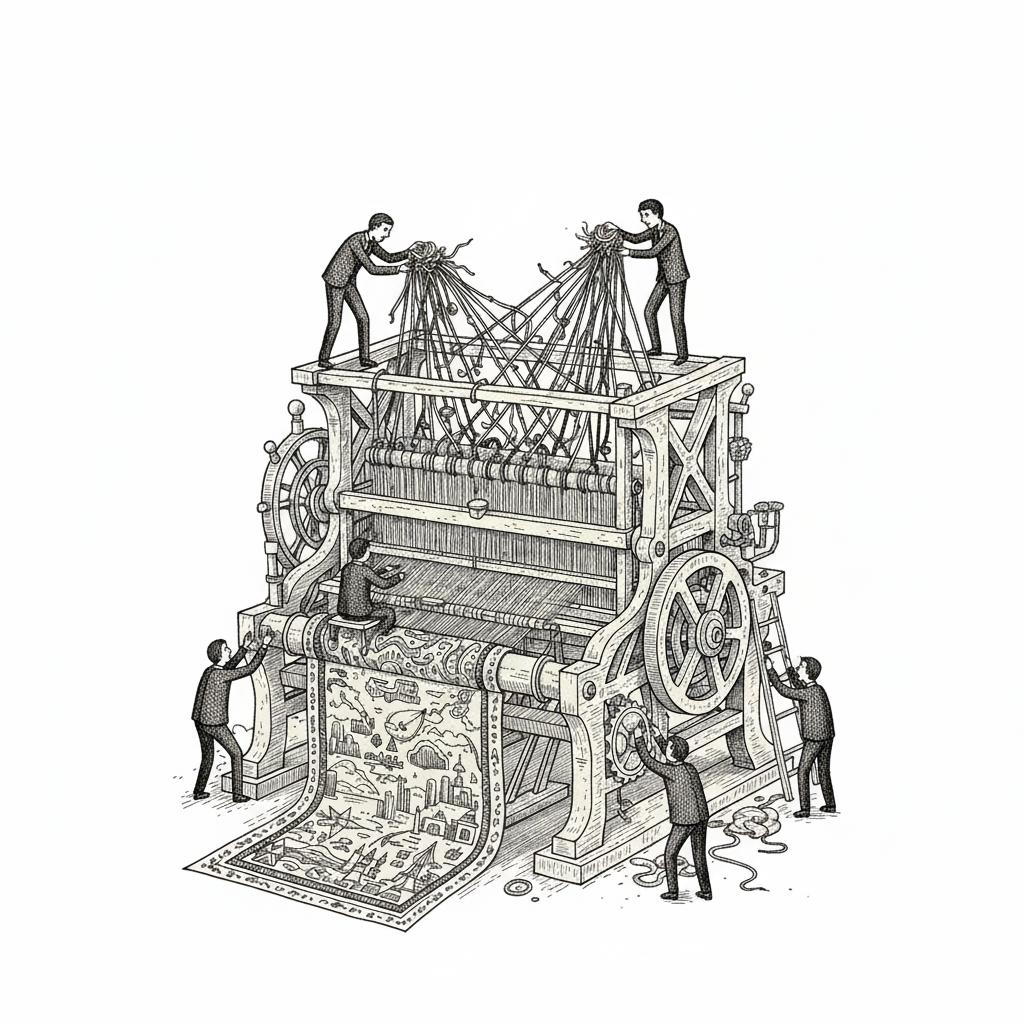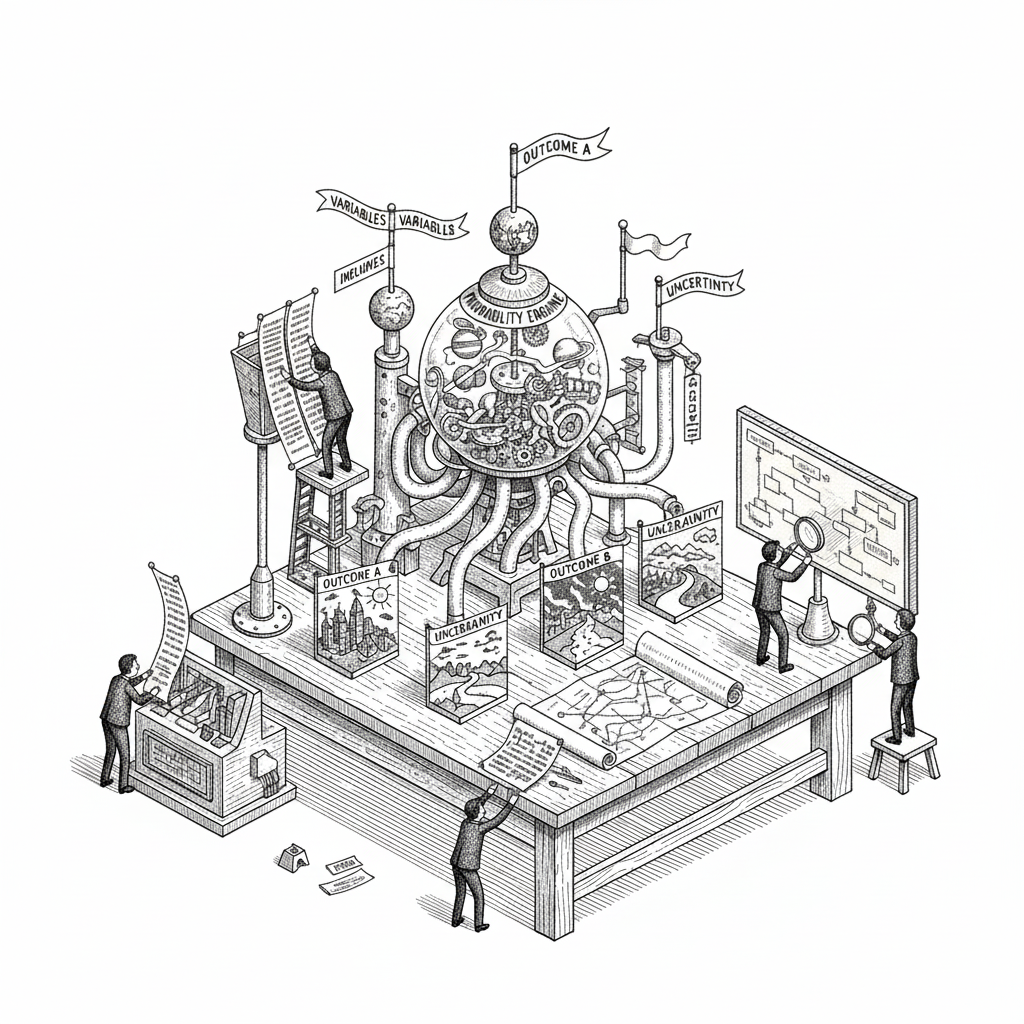Theory: AI for Human Reasoning
Our theoretical framework for understanding how artificial intelligence can enhance human reasoning and decision-making as AI capabilities expand and make our world more complex.
AI for Human Reasoning
As artificial intelligence capabilities expand, they will inevitably make our world more complex. The critical challenge is to ensure that our ability to understand and navigate this complexity grows in tandem. We believe a specific class of technologies, AI for Human Reasoning, is essential to this task. This approach prioritizes developing AI that augments human understanding and decision-making, ensuring that our collective wisdom can outpace the challenges we create.
What is AI for Human Reasoning?
Within the vast, high-dimensional space of potential AI capabilities, AI for Human Reasoning is the subset designed to improve the quality of human understanding and decision-making and collaboration. Inspiration for these applications comes from the fundamental ways humans already make sense of the world:
- Synthesizing Knowledge: Gathering and making sense of vast amounts of observations, data, and opinions.
- Clarifying Dialogue: Exploring areas of agreement and disagreement to surface opportunities for shared benefit.
- Forecasting Outcomes: Simulating and predicting the likely results of different policies and actions.
- Improving Deliberation: Facilitating debate on the merits of various objectives and their ethical implications.
- Strengthening Coordination: Enforcing contracts and other agreements to build trust and enable complex collaborations.

The dream of using technology to augment the human intellect—a "bicycle for the mind"—is not new; in fact it is what drove the early computer and internet pioneers. However, it's fair to say that the hype and utopianism of some of its adherents does lend one to be skeptical of new claims for revolutions of human reasoning.
While acknowledging the need to approach this area with discernment, we believe that we are at an inflection point where contemporary AI and other technologies provide unprecedented leverage to make this dream a reality.
- Reduced Cognitive Load: Unlike earlier technologies that required cumbersome human effort, AI acts as a seamless translation layer. It automates complex backend processing, greatly reducing the cognitive load on the user and making sophisticated reasoning tools practical for the first time.
- Accelerated Development Cycles: With AI agents now handling significant software engineering tasks, the time from concept to functional prototype has shrunk dramatically. This allows for the rapid creation and iteration of complex systems designed to support human reasoning, enabling ideas that were previously too ambitious to become actual practical tools.
- Unprecedented Scale and Speed: The ability to gather, communicate, and synthesize information from people and existing knowledge corpuses can create powerful new world models.
- Novel Functions: AI systems can serve in roles that require a high level of impartiality, creating trusted third parties.
Together, we expect that these quantitative differences will create a qualitative shift in what's possible in AI for Human Reasoning.
A Critical Safeguard
As AI capabilities grow, we are far from guaranteed to navigate this transition wisely. The most catastrophic failures in history, and the existential risks we face in the future, often stem not from pure malice but from people and institutions making critical mistakes, even by their own lights.
Improving human reasoning is therefore not just an optimistic goal; it is a critical safeguard. By providing tools that help us avoid unforced errors, clarify our true priorities, and understand the consequences of our actions, we can better navigate the challenges AI presents.
We expect the effort to uplift human reasoning is a robustly beneficial strategy across a wide range of potential futures.

Consider two common scenarios for AI development. If you expect a very acute and decisive AI takeoff, the wisdom of the developers and the ability of the public to clearly articulate their interests become paramount. If you expect a more diffused and multipolar AI rollout, society will face a dynamic and disorienting period of competition and disruption. In both cases, a populace equipped with better tools for reasoning, deliberation, and coordination is our best hope for a positive outcome.
The foundational tools for both scenarios have far more synergies than conflicts, and the technical possibilities to build them are opening up right now.
We must acknowledge that "better" decision-making for an individual is not always beneficial for society. A tool that helps one person understand persuasion could be used to mislead others, just as a tool that improves coordination could help a criminal conspiracy; however, we believe that the benefits of broad and democratized access to these reasoning tools will far outweigh the risks. When individuals and groups are better equipped to make sound judgments, it creates a more resilient and discerning society overall. The goal is to elevate the cognitive baseline for everyone, not just a select few.